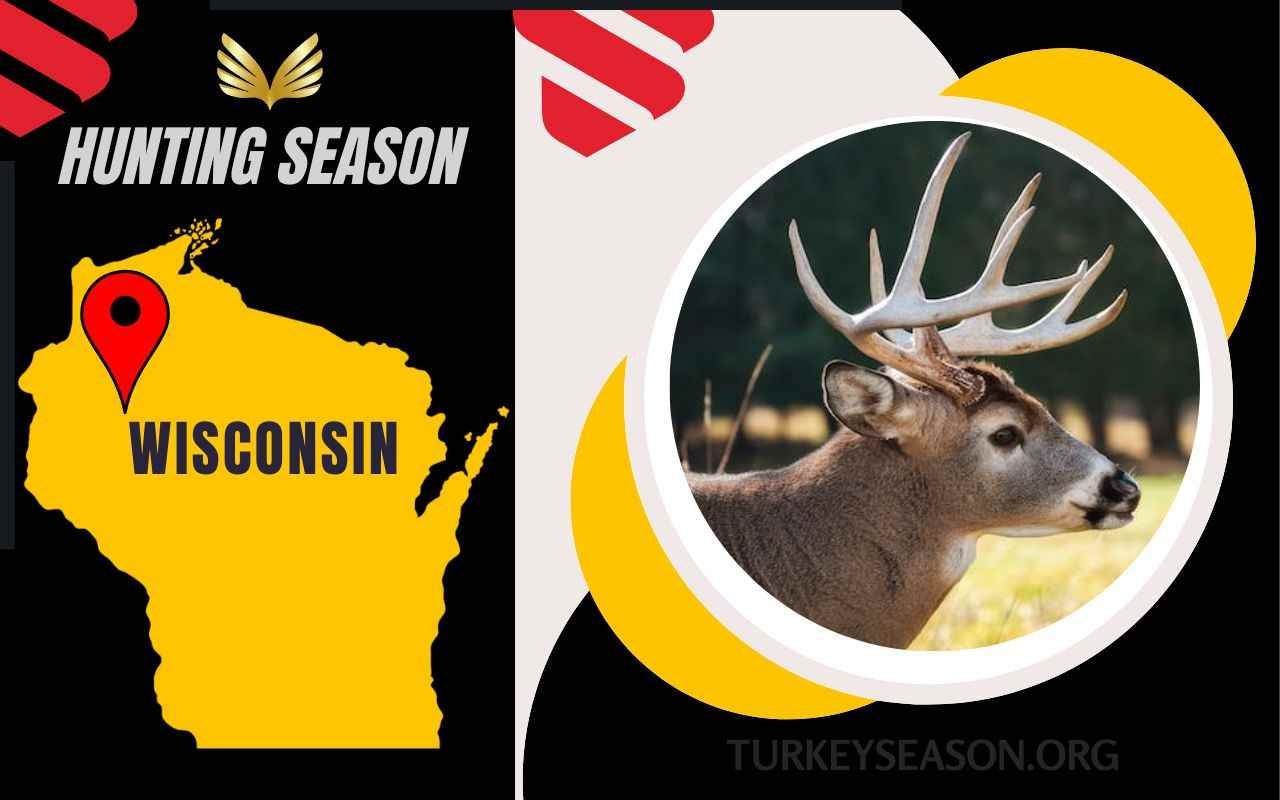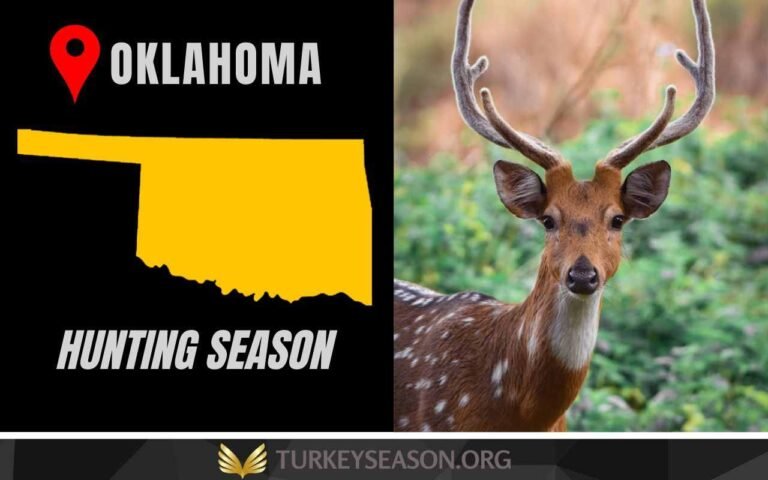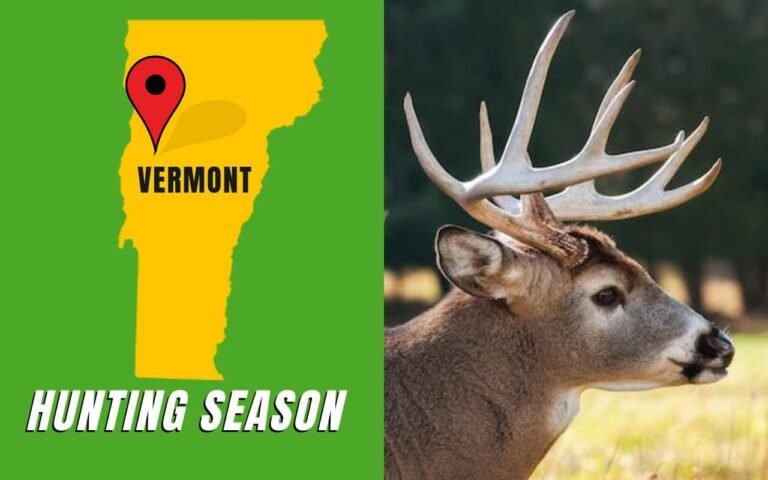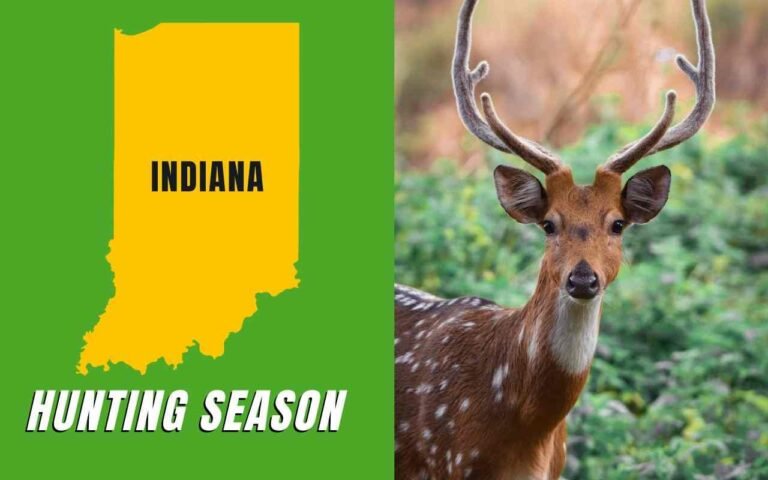Wisconsin Hunting Season 2023: The Ultimate Guide to Bagging Big Game!
Wisconsin Hunting Season 2023 is just around the corner! Wisconsin is a great destination to hunt since it has a variety of game species, and beautiful landscape. Its natural resources attract hunters from all backgrounds. Wisconsin promotes nature, heritage, and community. Hunters and outdoor enthusiasts must know hunting seasons and laws to protect animals, promote safety and avoid disputes. The Wisconsin Department of Natural Resources creates seasons and rules to help hunters follow the law, conserve animals, and get along with other nature lovers.
Different hunting seasons for various game species
Wisconsin has different game-hunting seasons. White-tailed deer archery and firearm seasons are popular. Spring and autumn turkey hunting are popular. The state’s rich wetlands provide waterfowl enthusiasts with duck, goose, and other migratory bird shooting seasons. Wisconsin offers pheasant, grouse, and quail hunting seasons. Hunters may enjoy their hobbies and help wildlife conservation throughout these seasons.
This article covers Wisconsin’s hunting seasons and game species. It highlights conservation, safety, and conformity with these seasons. This guide helps hunters and outdoor lovers safely and enjoyably navigate Wisconsin hunting seasons.
Wisconsin Game Species and Hunting Seasons 2023
Bear Hunting
| Bear Zones | Season Start Dates | Season End Dates |
|---|---|---|
| A, B, D | September 13, 2023 | October 3, 2023 |
| A, B, D | October 4, 2023 | October 10, 2023 |
| A, B, D | September 6, 2023 | September 12, 2023 |
| C, E, F | September 6, 2023 | October 10, 2023 |
Turkey Hunting
| WI Wild Turkey Season | Hunting Dates |
|---|---|
| Spring 2023 | |
| Period (A) | April 19, 2023–April 25, 2023 |
| Period (B) | April 26, 2023–May 2, 2023 |
| Period (C ) | May 3, 2023–May 9, 2023 |
| Period (D) | May 10, 2023–May 16, 2023 |
| Period (E ) | May 17, 2023–May 23, 2023 |
| Period (F) | May 24, 2023–May 30, 2023 |
| 2023 Spring Turkey Youth Hunt | April 15, 2023–April 16, 2023 |
| Fall 2023 | |
| Statewide | Sept 16, 2023-Nov 17, 2023 |
| Zones 1 - 5 | Nov 18, 2023–Jan 7, 2024 |
Deer Hunting
| WI Deer Season | Season Start | Season End |
|---|---|---|
| Gun | November 18, 2023 | November 26, 2023 |
| Muzzleloader | November 27, 2023 | December 6, 2023 |
| Gun hunt for hunters with disabilities | October 7, 2023 | October 15, 2023 |
| Youth deer hunt | October 7, 2023 | October 8, 2023 |
| December 4-Day Antlerless-Only Hunt | December 7, 2023 | December 10, 2023 |
| Antlerless-Only Holiday Hunt | December 24, 2023 | January 1, 2024 |
| Archery and Crossbow | September 16, 2023 | January 7, 2024 |
| Archery and Crossbow | September 16, 2023 | January 31, 2024 |
Ruffed Grouse Hunting
| Ruffed Grouse Season | Hunting Start Date | Hunting End Date |
|---|---|---|
| Zone A | 16-Sep-23 | 7-Jan-24 |
| Zone B | 14-Oct-23 | 8-Dec-23 |
Pheasant Hunting
| Pheasant Season | Hunting Start Date | Hunting End Date |
|---|---|---|
| Statewide | 14 Oct, 23 (9 a.m.) | 7-Jan-24 |
Hungarian partridge Hunting
| Hungarian partridge Season | Season Dates |
|---|---|
| Statewide (closed in Clark, Marathon, and Taylor counties) | October 14, 2023 (9 a.m.) -January 7, 2024 |
Bobcat Hunting
| Bobcat Hunting | Hunting Dates |
|---|---|
| North & South zones-Period-1 | October 14, 2023-December 25, 2023 |
| North & South zones zones-Period-2 | December 26, 2023-January 31, 2024 |
Coyote Hunting
| Coyote Season | Season Dates |
|---|---|
| Hunting | January 1, 2023-December 31 |
| Trapping | October 14, 2023-February 15, 2024 |
Fox Hunting
| Fox (red & gray) Season | Season Dates |
|---|---|
| Hunting | October 14, 2023-February 15, 2024 |
| Trapping | October 14, 2023-February 15, 2024 |
Beaver Hunting
| Beaver Hunting | Hunting Date |
|---|---|
| Zone A-northwest | November 4, 2023-April 30, 2024 |
| Zone B-northwest | November 4, 2023-April 30, 2024 |
| Zone C-south | November 4, 2023-March 31, 2024 |
| Zone D-Mississippi River | One day after the conclusion of duck season-March 15, 2024 |
Mink Hunting
| Mink Hunting | Season Dates |
|---|---|
| Mississippi River zone | November 13, 2023-March 10, 2024 |
| Southern Zone | November 4, 2023-March 15, 2024 |
| Northern Zone | October 21, 2023-April 15, 2024 |
| Central Zone | October 28, 2023-March 27, 2024 |
Muskrat Hunting
| Muskrat Season | Season Dates |
|---|---|
| Mississippi River zone | November 13, 2023-March 10, 2024 |
| Southern Zone | November 4, 2023-March 15, 2024 |
| Northern Zone | October 21, 2023-April 15, 2024 |
| Central Zone | October 28, 2023-March 27, 2024 |
Fisher Hunting
| Fisher Season | Season Dates |
|---|---|
| North Zones | October 14, 2023-January 7, 2024 |
| South Zones | October 14, 2023-January 7, 2024 |
Otter Hunting
| Otter Season | Hunting Start Date | Hunting End Date |
|---|---|---|
| North zone | 4-Nov-23 | 30-Apr-24 |
| South zone | 4-Nov-23 | 31-Mar-24 |
Raccoon Hunting
| Raccoon Season | Hunting Start Date | Hunting End Date |
|---|---|---|
| Resident | 14-Oct-23 | 15-Feb-24 |
| Non-resident | 28-Oct-23 | 15-Feb-24 |
Cotton Rabbit Hunting
| Cottontail Rabbit Hunting | Season Dates |
|---|---|
| Northern zone | September 16, 2023-February 29, 2024 |
| Southern zone | 14-Oct-23 (9 am)-February 29, 2024 |
| Milwaukee County | January 1, 2023-December 31 |
Squirrels Hunting
| Squirrels Season | Hunting Start Date | Hunting End Date |
|---|---|---|
| Statewide Squirrels (gray and fox) | 16-Sep-23 | 29-Feb-24 |
Licensing Requirements for hunting in Wisconsin
Hunting in Wisconsin requires a DNR license. Licenses and permits vary by game species and hunting technique. The Wisconsin DNR’s Regulations pamphlet covers small game, deer, migratory birds, bears, and elk.
Wisconsin requires hunting licenses for 16-year-olds. Senior, disability, and non-resident licenses are available. Some game species need tags and licenses. Deer hunting needs lottery-allocated tags.
Wisconsin requires hunters born after January 1, 1973, to take a hunter safety education course. This course teaches responsible hunting.
Wisconsin hunting bag and possession limits
Bag and possession limitations limit the number of game animals and birds a hunter may harvest and possess during a season. These rules promote sustainable hunting and animal conservation.
Wisconsin’s hunting rules include game species’ bag and possession limitations. The most game animals or birds a hunter may lawfully take in a season are bag limits. Deer hunting may have buck and doe bag limitations. However, a hunter may only lawfully possess a certain number of game animals or birds at a time, regardless of when or where they were collected. Know each species’ daily and seasonal bag and possession limitations.
Avoiding legal issues and promoting conservation requires following bag and possession limitations. Hunters must follow stricter possession or bag restrictions.
Safety Measures and ethical hunting practices in Wisconsin
Wisconsin significantly focuses on safety and moral hunting methods to provide a satisfying hunting experience and safeguard both sportsmen and animals. Several significant ethical and safety measures include:
1. Firearms Safety: It’s critical to handle weapons properly, adhere to safe handling procedures, and always be aware of your surroundings. General limits on firearms, bows, and crossbows are part of Wisconsin’s hunting laws.
2. Tree Stand Safety: Accidents involving tree stands may often result in injuries sustained while hunting. Hunters should use the correct safety harnesses, check the stability of the tree stands, and adhere to the suggested procedures for their safe usage.
3. Respect for Wildlife and Habitat: Ethical hunters prioritize protecting wildlife and its habitat. This entails ensuring that kills are clean, reducing suffering, and honoring hunting restrictions and property rights.
4. Adherence to rules: Hunters should know all hunting rules, including season dates, bag limits, and permitted and prohibited weapons. Responsible hunting requires adherence to these rules.
To keep current on safety precautions and moral standards, it’s crucial to check authoritative sources like the Wisconsin DNR’s Regulations handbook and the Wisconsin Hunting Regulations. Hunters may support wildlife conservation, advance sustainable hunting methods, and guarantee a safe and pleasurable hunting experience in Wisconsin by adhering to safety precautions and engaging in ethical hunting.
Hunting and conservation
Wisconsin hunting helps manage and conserve animals. It reduces game animal populations to protect crops and property. Hunting permits and tags assist animal and habitat protection. The Wisconsin Department of Natural Resources, Wisconsin Conservation Congress, and Wisconsin Wildlife Federation manage resources, advise on laws, and promote wildlife conservation. Hunting may help balance ecosystems by regulating populations, but it must be done responsibly.
Where to find Wisconsin hunting regulations and season information
The Wisconsin Department of Natural Resources (DNR) offers information on hunting laws and season dates. The DNR website has a hunting section with laws, seasons, and other resources. The DNR’s “Go Hunting” website provides season dates, public land maps, safety recommendations, hunting permits, and more. The Wisconsin DNR offers a laws pamphlet including small game, deer, migrating birds, bears, and elk laws. The Wisconsin hunting guide website also has current deer, turkey, waterfowl/migratory game birds, and hunting laws and restrictions. These sites advise Wisconsin hunters about hunting restrictions and seasons.
Frequently Asked Questions
Wisconsin's 2023 deer hunting seasons?
The 2023 Wisconsin deer hunting season includes the Youth Deer Hunt from October 7 to 8, the Gun Deer Hunt from November 18 to 26, the Muzzleloader Deer Hunt from November 27 to December 6, the December 4-Day Antlerless-Only Hunt from December 7 to 10, and the Antlerless-Only Holiday Hunt (limited to select Farmland Zone 2 counties) from December 24, 2023, to January 1, 2024. These dates allow hunters to hunt deer year-round. Check the Wisconsin Department of Natural Resources (DNR) or hunting rules for country-specific changes.
What do I need to hunt in Wisconsin?
Wisconsin requires hunting licenses for citizens and non-residents over 10. Hunting some games may need additional licenses and permissions. Deer and turkey hunting need licenses. Waterfowl hunters may need a minor game license, Wisconsin Waterfowl stamp, Federal Migratory Bird Stamp, and Canada Goose Permit. Complete a Hunter Education Course to get a Wisconsin Hunter Education Certificate if you were born after January 1, 1973. Non-residents aged 10–17 with Wisconsin-resident parents have specific provisions. Senior hunting licenses are available to Wisconsin seniors. For the latest rules, check the Wisconsin Department of Natural Resources.
Can you provide the hunting hours for Wisconsin Hunting Season 2023?
Depending on the season and the area of the state—whether it is in the northern or southern half—hunting hours in Wisconsin vary. Hunters are encouraged to review the official rules given by the Wisconsin Department of Natural Resources, or you may go to the link below to discover the proper hunting hours for a specific location and season:
Are there any specific zones or areas designated for hunting elk in Wisconsin?
Wisconsin has elk-hunting zones. Elk hunting occurs in two elk areas in Wisconsin: the Clam Lake herd in northern Wisconsin and the Black River Falls herd in southern Wisconsin. The Northern Elk Management Zone has allowed the hunting of the Clam Lake herd, while the Central Zone has allowed the hunting of the Black River Falls herd. Wisconsin DNR manages these elk populations. The Wisconsin Department of Natural Resources and mapping tools like X Maps provide accurate and up-to-date information on Wisconsin elk hunting zones and boundaries.
- Louisiana Turkey Season 2026: LA Turkey Hunting [Dates, Regulations, Licenses & More] - January 5, 2026
- Kentucky Turkey Season 2026: Latest Hunting Dates, Regulations & Licenses! - January 5, 2026
- Kansas Turkey Season 2026-2027: Latest Dates, Licenses, and Regulations Now Available! - January 3, 2026



